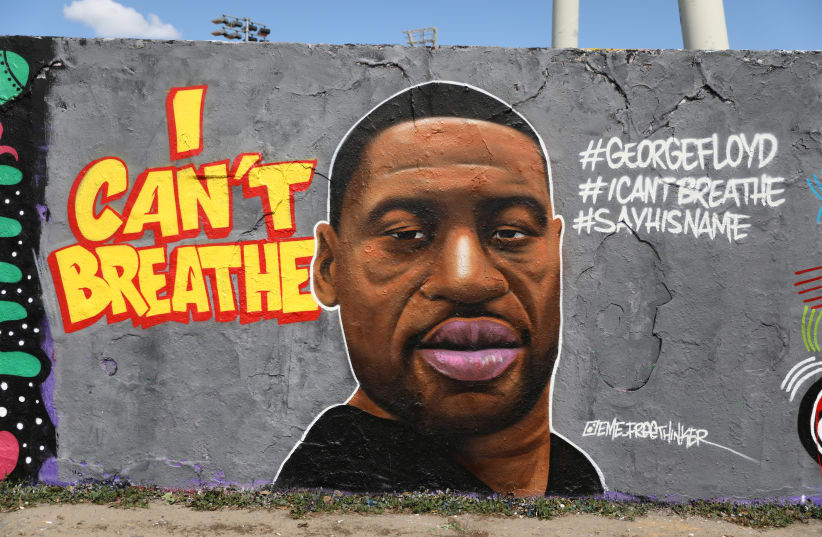A medical expert testifying in defense of former Minneapolis police officer Derek Chauvin told the jury on Wednesday he believed that George Floyd's death during his arrest was the result of heart disease making his heart beat erratically.
Dr. David Fowler, who was Maryland's chief medical examiner until his retirement in 2019, said exhaust fumes from the police car next to which Chauvin pinned Floyd to the road may also have contributed to Floyd's death in May 2020.
Fowler appeared to dispute at least some of the findings of Dr. Andrew Baker, Hennepin County's chief medical examiner, who ruled Floyd's death a homicide caused by Chauvin and other officers restraining Floyd in a way that starved his body of oxygen.
Fowler said he believed the manner of death could be considered a homicide in some lights, an accident in others, and so he would have instead ruled it "undecided."
Chauvin, who is white, has pleaded not guilty to murder and manslaughter charges. He was seen kneeling on the neck of Floyd, a Black man in handcuffs, for nine minutes in bystander video that sparked global protests against police brutality.
Here are some important moments from the 13th day of testimony and the second day of the defense case in Chauvin's trial:
DR. DAVID FOWLER, FORENSIC PATHOLOGIST
Fowler said he had studied the findings of the county's chief medical examiner and decided that Floyd's death was caused by his heart suddenly beating in an erratic way, known as sudden cardiac arrhythmia.
He said this was a result of his "atherosclerotic and hypertensive heart disease" during the police restraint, using medical terms to describe the narrowing of blood vessels and heart problems caused by high blood pressure.
Fowler said the way Floyd struggled with police trying to get him into their car may have caused stress that led to cardiac arrhythmia.
The fentanyl and methamphetamine found in Floyd's blood and carbon monoxide poisoning from the exhaust fumes of the adjacent police car may have contributed to the death, Fowler said. Eric Nelson, Chauvin's lead lawyer, spent many minutes asking Fowler to describe the toxins found in car exhaust and how it can kill people even in an outdoor area.
Asked by Nelson why Chauvin and other officers by the car were not harmed by carbon monoxide poisoning, Fowler replied that their heads were farther from the exhaust pipe than was Floyd's, and "hopefully they're younger" than Floyd. Chauvin was 44 and Floyd was 46 at the time of Floyd's death.
The jury has previously heard from medical experts called by prosecutors from the Minnesota attorney general's office, who say Floyd had high blood pressure, a slightly enlarged heart and used opioid painkillers but that none were the cause of his death.
Those experts agreed with the findings on Floyd's death certificate, saying he was killed because he was unable to inhale sufficient oxygen due to the way police compressed his prone body against the road. Baker, the chief medical examiner who certified Floyd's death, told the jury he stands by his findings.
Nelson asked Fowler if Floyd died in a homicide or by some other manner.
"This is one of those cases where you have so many conflicting different manners," Fowler said. "The carbon monoxide would usually be classified as an accident, although somebody was holding him there so you could elevate that to a homicide."
In the end, he said he would "fall back to 'undetermined' on this particular case."
Fowler has been involved in other high-profile cases involving police using force against Black people. His office ruled the 2015 death of Freddie Gray a homicide after Gray, 25, suffered spinal injuries in the back of a police van in Baltimore.
In December, Fowler was sued in federal court by the family of Anton Black, who was 19 when he died in 2018 after police pinned him face down on the ground for several minutes as he cried out for his mother. Fowler ruled Black's death an accident caused by the "the stress of his struggle."
Black's family cited similarities with Floyd's death in their lawsuit, in which they said Fowler and other Maryland officials "covered up and obscured police responsibility" for Black's death. Lawyers for Fowler say the way he certified Black's death did not infringe on the constitutional rights of Black's family.
